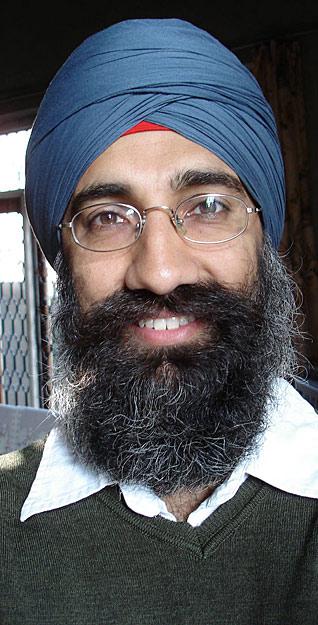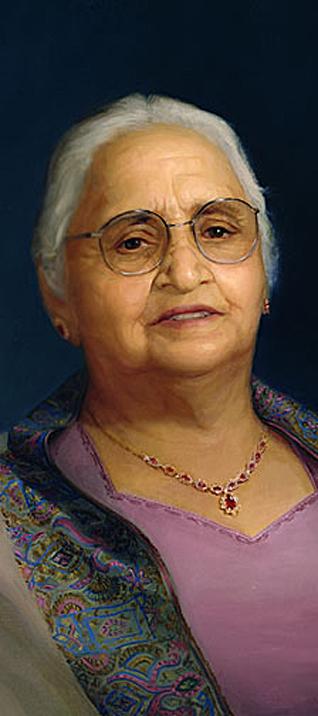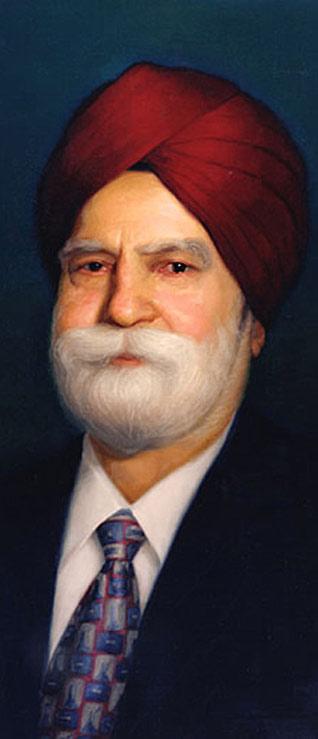
Balbinder
Singh
Both images below are from portraits by Manu Kaur Saluja

Sardarni
Kuljit
Kaur

Sardar
Ishar
Singh
People
Hofstra University Appoints New Sikh Chair
Sardar Balbinder Singh Bhogal, Ph.D., has been appointed the Sardarni Kuljit Kaur Bindra Chair in Sikh Studies at Hofstra University, New York, U.S.A., the University President, Stuart Rabinowitz, announced today.
Dr. Bhogal will be formally installed on Tuesday, Nov. 13, 2007 at 5 p.m. at the University Club, north campus. His appointment is effective as of September 1, 2007.
"I am delighted to be the next holder of this important chair that has done so much to reinvigorate the field of Sikh Studies", said Dr. Bhogal. "This position shows the continued commitment Hofstra University and the Bindra family have towards a true renaissance in the academic study of Sikh religion, philosophy, history, literature, culture and aesthetics. I am honored to be given an opportunity to explore, broaden and further develop this vision in partnership with other Sikh Chairs and related scholars".
Prof. Bhogal, newly arrived from Toronto, Canada, is the second holder of the chair (which was established in September of 2000). The first was Sardar Arvind-Pal Singh Mandair, who has now gone on to the University of Michigan.
Dr. Bhogal was most recently an associate professor in South Asian religions and cultures, Division of Humanities, Faculty of Arts, at York University in Toronto.
He received his Ph.D. from London University, School of Oriental and African Studies, 2001, and his B.A. (Hons) from Lancaster University. He has served as a professor in departments of religion, philosophy and humanities in universities in England, the United States and Canada. Dr. Bhogal's interests include South Asian religions and cultures, specializing in Sikh Studies, particularly the philosophy and exegesis of the Guru Granth Sahib; hermeneutic and translation theory and its radicalization through deconstruction; the relationship and interaction between Indian and Western/Continental philosophies; the study of mysticism; and orientalist and postcolonial discourses.
He has authored two articles in the Routledge Journal called Sikh Formations: Religion, Culture, Theory: "Ghostly Disorientations: Translating the Adi Granth as the Guru Granth" (2006), and "Questioning Hermeneutics with Freud: How to Interpret Dreams and Mute-Speech in Sikh Scripture" (2005).
He has also published three chapters in the following books: "Text as Sword: Sikh Religious Violence Taken for Wonder", in King and Hinnells' edited volume, Religion and Violence in South Asia: Theory and Practice, (Routledge, 2006), "Cross-Cultural Dialogues with Western Fictions: 'There is no Hindu nor Muslim - nor Sikh'", in Hart's edited volume, Multifaith Britain: An Experiment in Worship, (O Books, 2002), and "On the Hermeneutics of Sikh Thought and Praxis", in Shackle, Singh and Mandair's edited volume, Sikh Religion, Culture and Ethnicity, (Curzon, 2001).
Dr. Bhogal has also engaged with public outreach, being invited to speak as an expert in South Asian religions. In this regard, he has served as a judge in the Art and Literature competition at Toronto's Fourth Annual Spinning Wheel Film Festival, and has made six television appearances as a guest on the "3D-Dialogue" TV-talkshow on the OMNI-TV Network in Canada.
Dr. Bhogal is scheduled to participate in "The Politics of Religion-Making" conference at Hofstra University, sponsored by the Hofstra Cultural Center and the Department of Religion, October 4, 5 and 6, 2007, and will also present "Questioning Secularism from the standpoint of Religion - Or, How to Encounter Cultural Difference" at the American Academy of Religion in San Diego, November 2007. He is currently working on two book projects reinterpreting Sikh scripture.
The Sardarni Kuljit Bindra Chair in Sikh Studies is endowed by Sardar Ishar Singh Bindra and his family, in honor of Sardar Bindra's wife and family matriarch, Sardarni Kuljit Kaur Bindra. The chair was established to promote the academic study of Sikh religion, culture and history. The endowment supports the appointment of a faculty member in Sikh Studies, helps build the University Library's holdings in Sikhism, provides scholarship assistance to students interested in Sikh religion and culture, and funds annual conferences and lectures directed toward the academic community as well as the general public.
Hofstra University is a dynamic private institution where students find their edge to succeed in more than 140 undergraduate and 155 graduate programs in liberal arts and sciences, business, communication, education and allied human services, honors studies, and a School of Law.
[Courtesy: Hofstra University]
Conversation about this article
1: I.J. Singh (New York, U.S.A.), August 23, 2007, 9:27 PM.
Congratulations to Balbinder Singh Bhogal. He is excellent and would be a sorely needed expert on Sikhism and Guru Granth in this part of the United States. Welcome to New York.
2: Jagdeep Singh (London, England), August 24, 2007, 9:53 AM.
Balbinder Singh's research and work sounds interesting and exciting. Congratulations on this appointment. And my respects to the Bindra family for honouring their mother with such a great endowment.
3: Tejwant (USA), August 24, 2007, 1:55 PM.
Pardon my ignorance but I do not understand the core objectives of these Sikh chairs that are sprouted up in North American Universities. How do they serve the Sikhs and the Sikh cause? Can this money be spent to instill Sikhi values in the Sikhs, especially in Punjab, so that it can be the place of hope and prosperity, rather than of desperation and hopelessness? Just thinking aloud.
4: D.J.Singh (U.S.A.), August 24, 2007, 9:46 PM.
Sikhism is about community living. Guru Nanak started the idea of sharing and giving for the sangat. Guru Amar Das channelized the giving process by establishing manjis. Guru Ram Das wanted the Sikhs to set apart ten percent of their income for the common pool. Guru Gobind Singh codified the custom of dasvandh in the rehatnaamas. Sikh Chairs have been established to serve the community. The purpose of these Chairs in Universities is to promote the study of Sikh religion, philosophy and literature in the academic setting. No doubt, there are other ways to serve the community: SALDEF, sikhnet.org, sikhchic.com, serving in gurdwaras, adopting a less fortunate child, feeding the hungry, etc., etc. We commend the efforts of all. We, however, do not endorse one method over the other. Carbohydrates, proteins, fat, vitamins and minerals, are all important constituents of nutrition and have an important role to play in our diet. A balanced diet is however best for nutrition. Also, brain, heart, lungs, kidneys are all important parts of the human body and all of them have an important role in the existence of an individual. Similarly, there are different ways to serve the community. Do not neglect any aspect of service. All have a place. As long as you work within the framework of the community, following their rules and regulations, you may serve your community as you please. Sikh Chairs are intended to promote Sikh traditions. Their intent is not to challenge the authenticity of Sikh scriptures. The Gurus considered truthful living to be better than a mere belief in Truth.
5: Ruby Kaur (Oxford, England), August 24, 2007, 9:49 PM.
Tejwant, the core objective is of intellectual enquiry. That is in itself a vital thing. That is how minds, societies and communities advance and learn. Knowledge and education are precious things in their own right. The Sikh world needs more free critical inquiry and intellectual debate. As for your question about how do these chairs serve "the Sikh cause"? Well, first of all, thinking that any form of intellectual endeavour has to "advance" a single cause in a utilitarian, physically quantifiable manner limits the mind to a restrictive narrative. It oppresses plural voices and ideas. It also begs the question: who decides what the "Sikh cause" is? I think we have had enough of individual voices and minds being bullied, marginalised or slandered because they don't conform to certain assumptions about what Sikh studies and intellectual inquiry is or "should" be about, what we are allowed to discuss, critically examine or think freely about. Freedom of thought and speech and intellectual inquiry is vital to opening and keeping alive the collective mind of the Sikh community around the world, to challenge corruptions and narrow mindedness, to also challenge disadvantage and prejudice against us, and to help us understand our place in the world; both in India, and in the diaspora, where we are faced with countless important issues and pressures. So as you can see, there are many vital needs that these chairs and appointments respond to.
6: Tejwant (U.S.A.), August 25, 2007, 3:55 PM.
Interesting angles of the same prism. Allow me to take a peek through them. Yes, Sikhism is about community living. Yes, the core objective is of intellectual enquiry. My question is how can we become a part of this community? How can we learn from this intellectual enquiry? What is the modus operandi that can morph this feel good to do good? How can a lay man like me tap into the potential of the present and future free thinkers of Sikhi, the active participants of these chairs? Is there a cross pollination amongst these chairs scattered in the North American Universities or are they like stand-alone flower bouquets, perfectly clipped to look good in some expensive crystal vases, pumped with some Miracle Gro to prolong their already shortened lives? It is very well known that all bouquets end up withering no matter how many vitamins are used. Only by cross pollination, that Gurmat orchards can thrive otherwise they turn into lonely tumbleweeds, rolling on empty desert roads. How can I savour this Gurmat Langar? Are there any papers from these chairs available on the internet for us to learn from? I want to be a part of this. I would like to dive into this Gurmat nectar whose pool is constantly pumped by Gurbani Vichaar. Or are these mere individual bubbles dotting the Sikhi Ocean? We all know that lonely bubbles can not have the ripple effect that our Sikhi is thirsty for and is in dire need of.
7: Wandering (Edmonton, Alberta), August 25, 2007, 5:40 PM.
Guru Nanak Dev Ji never held the brahmins in great esteem. He challenged and ridiculed their modus operandi, their outlook and their fervent practice of discrimination based on, inter alia, their pride in religious and worldly learnings. Anyone who has tried to understand and follow - and not deconstruct - the message of Guru Nanak Dev Ji will know this. Religion is about faith, submission and following the path of the Guru.
8: D.J.Singh (U.S.A.), August 26, 2007, 10:16 AM.
Endowment of a Sikh Chair supports a Sikh professor, Punjabi and ultimately Sikhism on a permanent basis in the universities. This creates a platform for Sikhs and non-Sikhs to interact and explore the rich heritage of Sikhism. This will clarify some of the misunderstandings the Americans, for example, have about the Sikhs, their religion, culture and tradition. These chairs also provide scholarship assistance to second generation Sikh students. We therefore commend the generosity of the Bindra family for endowing a Chair in Sikh Studies at Hofstra University. We hope that other philanthropists will also donate funds to universities and help improve our national and international image.
9: Harbans Lal (Arlington, Texas, U.S.A.), August 26, 2007, 11:50 AM.
I like to ditto DJ Singh's comments on the role and usefulness of Sikh programs, Sikh chairs and university-based research projects on the message of Sikhi. I have known Dr. Balbinder Singh Bhogal for a few years and appreciate his area of research on the tradition of the Guru Granth exegeses. We need ever more to sharpen our skills of translating our Guru's message to the ever-changing demographics of humanity and its cultures. Prof. Bhogal is likely to make new and novel contributions. We wish him God-speed and thank the Bindra family for helping to make it happen.
10: Surjeet Singh (London, England), August 28, 2007, 1:04 PM.
I think the cynicism over such Chairs emanates from the experience the community has had at other Universities, vis-a-vis some of their holders, such as Harjot Oberoi, amongst a few others. A lot of money had gone into these Chairs and unless they have been created solely to serve the egotistical needs of some wealthy Sikhs and provide renumeration for some "free thinkers", then the community has to have a say in how these Chairs can serve the cause of the community better. In answer to Ruby Kaur's question of what is the "Sikh Cause", well, it certainly isn't the attacking of the authenticity of the Guru Granth Sahib or the creation of a "folk Sikhism" which falls prey to rituals, idol worship, castes, etc. ... the very things that the Gurus worked hard to eradicate. The jury is still out on these Chairs.
11: Harpreet Multani (New York, U.S.A.), November 11, 2007, 8:57 PM.
I would like to congratulate Sardar Balbinder Singh Bhogal for his appointment to the Chair in Sikh Studies at Hofstra. Although I have not taken any of Balbinder's classes, I am sure he is a great professor and will lead this program to great heights.
12: Satish Bindra (Library of Congress - Asian Div., South Asia) (Washington, D.C., U.S.A.), February 15, 2008, 4:59 PM.
Congrats to Dr. Balbinder Singh Bhogal for his appointment to this prestigious post.
13: Sam Murray (Netherlands), January 31, 2009, 7:00 AM.
Good to see Balbinder doing so well and opening up so many more minds to the richness of his own Sikh tradition. I was a student of his at the University of Derby in England several years ago and he made a great and lasting impression and was a great and inspiring teacher. Dr. Balbinder Singh Bhogal unbeknowingly did a lot to inspire me to write about my own Christian tradition from fresh perspectives, a task that has become the mainspring of my life. He is a blessing to us all, regardless of our background and culture.
14: Kulmohan Singh (New Delhi, India), August 27, 2010, 11:05 AM.
Dr. Balbinder Singh ji: GurFateh. You are a great symbol of Sikhism, Sir.


